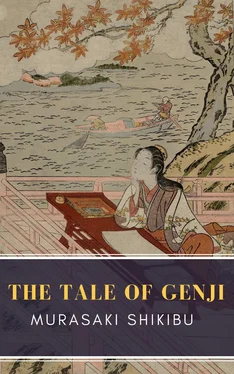The moon set. The wicks in the lamps had been trimmed more than once and presently the oil was gone. Still he showed no sign of retiring. His mind on the boy and the old lady, he jotted down a verse:
“Tears dim the moon, even here above the clouds.
Dim must it be in that lodging among the reeds.”
Calls outside told him that the guard was being changed. It would be one or two in the morning. people would think his behavior strange in deed. He at length withdrew to his bedchamber. He was awake the whole night through, and in dark morning, his thoughts on the blinds that would not open, he was unable to interest himself in business of state. He scarcely touched his breakfast, and lunch seemed so remote from his inclinations that his attendants exchanged looks and whispers of alarm.
Not all voices were sympathetic. perhaps, some said, it had all been foreordained, but he had dismissed the talk and ignored the resentment and let the affair quite pass the bounds of reason; and now to neglect his duties so — it was altogether too much. Some even cited the example of the Chinese emperor who had brought ruin upon himself and his country.
The months passed and the young prince returned to the palace. He had grown into a lad of such beauty that he hardly seemed meant for this world — and indeed one almost feared that he might only briefly be a part of it. When, the following spring, it came time to name a crown prince, the emperor wanted very much to pass over his first son in favor of the younger, who, however, had no influential maternal relatives. It did not seem likely that the designation would pass unchallenged. The boy might, like his mother, be destroyed by immoderate favors. The emperor told no one of his wishes. There did after all seem to be a limit to his affections, people said; and Kokiden regained her confidence.
The boy’s grandmother was inconsolable. Finally, because her prayer to be with her daughter had been answered, perhaps, she breathed her last. Once more the emperor was desolate. The boy, now six, was old enough to know grief himself. His grandmother, who had been so good to him over the years, had more than once told him what pain it would cause her, when the time came, to leave him behind.
He now lived at court. When he was seven he went through the ceremonial reading of the Chinese classics, and never before had there been so fine a performance. Again a tremor of apprehension passed over the emperor — might it be that such a prodigy was not to be long for this world?
“No one need be angry with him now that his mother is gone.” He took the boy to visit the Kokiden Pavilion. “And now most especially I hope you will be kind to him.”
Admitting the boy to her inner chambers, even Kokiden was pleased. Not the sternest of warriors or the most unbending of enemies could have held back a smile. Kokiden was reluctant to let him go. She had two daughters, but neither could compare with him in beauty. The lesser ladies crowded about, not in the least ashamed to show their faces, all eager to amuse him, though aware that he set them off to disadvantage. I need not speak of his accomplishments in the compulsory subjects, the classics and the like. When it came to music his flute and koto made the heavens echo — but to recount all his virtues would, I fear, give rise to a suspicion that I distort the truth.
An embassy came from Korea. Hearing that among the emissaries was a skilled physiognomist, the emperor would have liked to summon him for consultation. He decided, however, that he must defer to the emperor Uda’s injunction against receiving foreigners, and instead sent this favored son to the Kōro mansion, where the party was lodged. The boy was disguised as the son of the grand moderator, his guardian at court. The wise Korean cocked his head in astonishment.
“It is the face of one who should ascend to the highest place and be father to the nation,” he said quietly, as if to himself. “But to take it for such would no doubt be to predict trouble. Yet it is not the face of the minister, the deputy, who sets about ordering public affairs.”
The moderator was a man of considerable learning. There was much of interest in his exchanges with the Korean. There were also exchanges of Chinese poetry, and in one of his poems the Korean succeeded most skillfully in conveying his joy at having been able to observe such a countenance on this the eve of his return to his own land, and sorrow that the parting must come so soon. The boy offered a verse that was received with high praise. The most splendid of gifts were bestowed upon him. The wise man was in return showered with gifts from the palace.
Somehow news of the sage’s remarks leaked out, though the emperor himself was careful to say nothing. The Minister of the Right, grandfather of the crown prince and father of the Kokiden lady, was quick to hear, and again his suspicions were aroused. In the wisdom of his heart, the emperor had already analyzed the boy’s physiognomy after the japanese fashion and had formed tentative plans. He had thus far refrained from bestowing imperial rank on his son, and was delighted that the Korean view should so accord with his own. Lacking the support of maternal relatives, the boy would be most insecure as a prince without court rank, and the emperor could not be sure how long his own reign would last. As a commoner he could be of great service. The emperor therefore encouraged the boy in his studies, at which he was so proficient that it seemed a waste to reduce him to common rank. And yet — as a prince he would arouse the hostility of those who had cause to fear his becoming emperor. Summoning an astrologer of the Indian school, the emperor was pleased to learn that the Indian view coincided with the japanese and the Korean; and so he concluded that the boy should become a commoner with the name Minamoto or Genji.
The months and the years passed and still the emperor could not forget his lost love. He summoned various women who might console him, but apparently it was too much to ask in this world for one who even resembled her. He remained sunk in memories, unable to interest himself in anything. Then he was told of the Fourth Princess, daughter of a former emperor, a lady famous for her beauty and reared with the greatest care by her mother, the empress. A woman now in attendance upon the emperor had in the days of his predecessor been most friendly with the princess, then but a child, and even now saw her from time to time.
“I have been at court through three reigns now,” she said, “and never had I seen anyone who genuinely resembled my lady. But now the daughter of the empress dowager is growing up, and the resemblance is most astonishing. One would be hard put to find her equal.”
Hoping that she might just possibly be right, the emperor asked most courteously to have the princess sent to court. Her mother was reluctant and even fearful, however. One must remember, she said, that the mother of the crown prince was a most willful lady who had subjected the lady of the paulownia Court to open insults and presently sent her into a fatal decline. Before she had made up her mind she followed her husband in death, and the daughter was alone. The emperor renewed his petition. He said that he would treat the girl as one of his own daughters.
Her attendants and her maternal relatives and her older brother, Prince Hyōbu, consulted together and concluded that rather than languish at home she might seek consolation at court; and so she was sent off. She was called Fujitsubo. The resemblance to the dead lady was indeed astonishing. Because she was of such high birth (it may have been that people were imagining things) she seemed even more graceful and delicate than the other. No one could despise her for inferior rank, and the emperor need not feel shy about showing his love for her. The other lady had not particularly encouraged his attentions and had been the victim of a love too intense; and now, though it would be wrong to say that he had quite forgotten her, he found his affections shifting to the new lady, who was a source of boundless comfort. So it is with the affairs of this world.
Читать дальше












